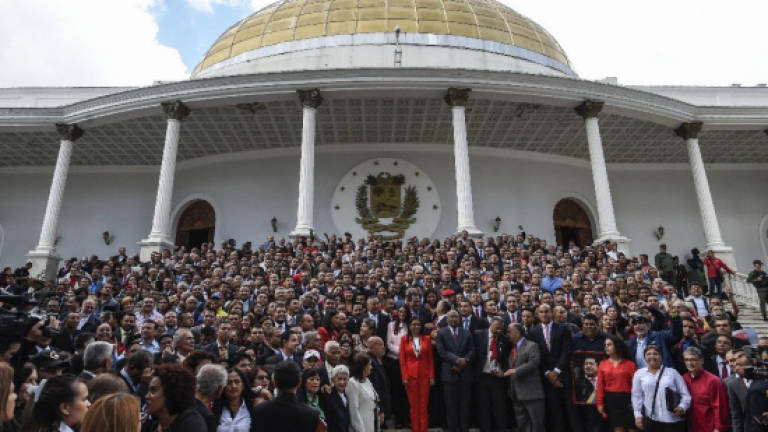New assembly dividing Venezuela begins work

CARACAS: A new assembly packed with allies of unpopular President Nicolas Maduro and with sweeping powers was to begin work on Saturday, deepening divisions in a crisis-wracked Venezuela.
The Constituent Assembly, headed by a former foreign minister, Delcy Rodriguez, is tasked with rewriting the 1999 constitution into a charter Maduro has promised will end the turmoil rocking his impoverished yet oil-rich nation.
On Friday, the body took over an ornate chamber under a golden dome in the Legislative Palace in Caracas – at the far end of a building shared with the opposition-run legislature, the National Assembly.
Elected a week ago amid bloody protests and international objections, the Constituent Assembly has powers to override every branch of government, and can dissolve the legislature.
Its detractors say the 545 loyalist members – among them the president's wife and son – amount to a rubber-stamp entity extending Maduro's "dictator"-like grip on power.
International condemnation
The United States, the European Union, the Vatican and major Latin American nations including Mexico, Argentina and Chile have all condemned the new body, saying it undermines democracy and stokes tensions in Venezuela.
Mercosur, a South American trading bloc, was meeting on Saturday in Brazil to decide whether Venezuelan should be suspended from it for "breaching democratic order."
The legitimacy of the Constituent Assembly has been thrown into question by claims of fraud, most notably by a British-based firm, Smartmartic, which was involved in supplying the technology for the July 30 vote.
Smartmatic said the official turnout figure had been "tampered with" and exaggerated by at least one million voters.
The opposition has vowed to maintain street protests against the assembly, despite being increasingly sidelined and despondent.
Maduro's security forces have stepped up pressure on dissenters. The Vatican has urged them to show restraint after a death toll from four months of unrest of 125.
A prominent opposition leader, Leopoldo Lopez, was thrown back in military prison after the intelligence service roughly ended a brief spell of house arrest granted last month.
Another leader, Caracas mayor Antonio Ledezma, was released back into home detention on Friday after being hauled away the same day as Lopez.
'Interference' rejected
Maduro has rejected the criticism lobbed at him, saying the revised constitution issued by the Constituent Assembly would be put to a referendum.
He also accused the United States of "imperialism" after it hit him with direct sanctions and threatened to do the same with all of the assembly's members.
And he lashed out at fellow Latin American leaders for being vassals of America.
Rodriguez on Friday said: "The international community should not make a mistake over Venezuela. The message is clear, very clear: we Venezuelans will resolve our conflict, our crisis without any form of foreign interference."
That conflict runs deep however, and Maduro counts on no more than 20% public support, according to surveys by the Datanalisis polling firm.
His authority relies on backing from the military and judicial and electoral authorities.
Their actions in past months against those raising their voices against Maduro prompted the Inter-American Commission on Human Rights on Friday to order Venezuela to protect Venezuela's attorney general, Luisa Ortega.
The commission said it believed Ortega's life was at risk after breaking with Maduro months ago and launching an investigation into the legality of the Constituent Assembly.
There are also concerns Venezuela's dire economic straits – seen in lines for scarce food and essentials, and desperate searches for rare medicine – could soon get even worse.
The currency, the bolivar, lost around a third of its value this week, accelerating a long slide. Inflation forecasts for this year are soaring above 700%. And the country has dwindling reserves with which to pay its debt, big bills of which come due in Oct and Nov.
Maduro has dismissed the problems as part of an "economic war" waged against him by the opposition in collaboration with the United States.
His main sources of support from abroad are Cuba, whose socialist model he admires, and Russia, which holds billions in Venezuelan debt. — AFP